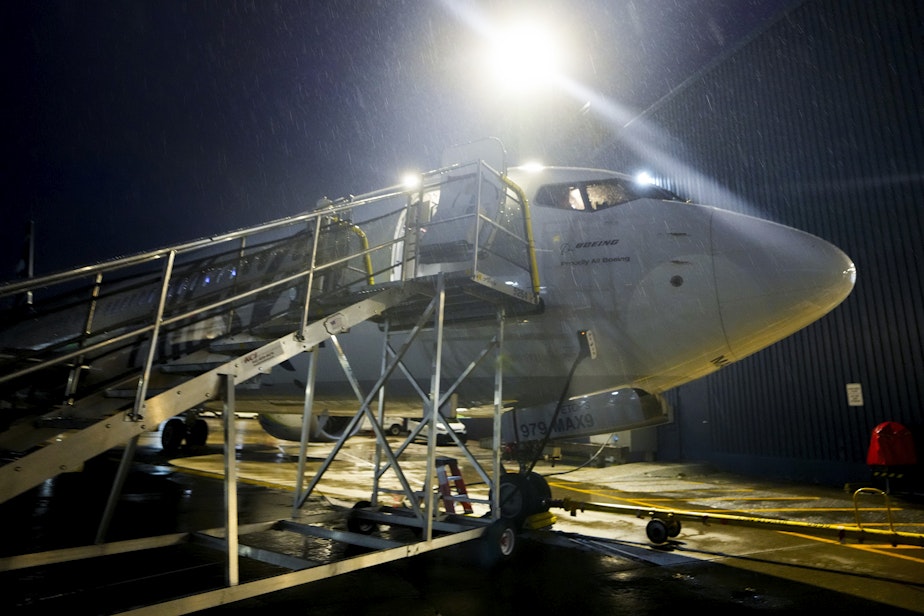Can Boeing bounce back from its reputational nosedive? Here's what it could take

United Airlines and Alaska Airlines have started returning their reinspected Boeing 737 Max 9 planes to service. The jet was grounded after a door plug blew off a flight in early January.
No one died, but Boeing's once golden reputation for safety and engineering took another major hit six years after two Max jets crashed, killing over 300 people. The question now is, can Boeing turn this around? And if so, what would it take?
Bill Saporito is an editor-at-large at Inc. Magazine. In a recent New York Times opinion piece, he focused on Boeing's tarnished reputation for quality and safety. KUOW’s Kim Malcolm asked him about his focus on corporations like Alcoa, which in the 1980s addressed failures and overhauled its culture.
This interview has been edited for clarity.
Bill Saporito: You have a new (Alcoa) CEO come in, Paul O'Neill, and he says, "We are going to focus on safety." Manufacturing companies, particularly those working in metal have huge issues over safety. What he said is that we're going to make this a safe place to work. And when you do that — when the employees know that the company has their back — they improve, they appreciate that. Safety goes up, defects go down, throughput goes up. So, everybody wins. And then investors get paid too because you're selling more stuff.
Any kind of change in corporations — it's a hard sell. You've got to convince a lot of people. But when the CEO gets behind it — when the management really and truly gets behind it — it can happen.
Kim Malcolm: And you brought up Alan Mulally at Ford as well. What's pertinent about that example?
Sponsored
Alan Mulally was the head of Boeing Commercial. He was an aerospace engineer. He gets passed over for the CEO spot. And then a couple of years later, he ends up as the CEO of Ford, and he turns Ford around. This is a guy who understands the manufacturing process, clearly. What he also understands is that he has to empower people to embrace what's wrong, to accept that things aren't going right, and we're all going to face that honestly and change it. And that is what happened at Ford, and it can happen at Boeing.
What would it take for that to happen at Boeing?
Well, it's got to be top-down. It's got to be a commitment from the top. And it may also need a change in the way that top management is compensated. Once we shift towards compensating management with the share price that can change things, that can make you short-term focused. So maybe the compensation structure has to change too so that it's going to reward safety, it's going to reward fewer defects. It's getting everything aligned.
Company management are not the only players here, of course — we have the unions who are doing this work. What role do they have to play here?
They have a big role because they're doing the work, right? So, management has to stop treating them like the enemy, which seems to be part of the problem, and really get them to be partners in it, and that can happen. It’s happened in the past and it can happen in the future.
Sponsored
Boeing CEO, Dave Calhoun, has said they're refocusing on safety. So what are some of the challenges that Calhoun and everyone who works at Boeing are facing right now?
What they're facing is they have a trust issue. They have a trust issue with their customers, they have a trust issue with their employees, and they have a trust issue with the general public via the airlines themselves. So that has to be attacked. They need to build trust at every level as quickly as they can. And of course, the best way to do this is to make flawless aircraft.
Some folks outside of Boeing may think this is a pretty rough situation, and it's hard to see a path forward for Boeing out of this. How pessimistic or optimistic are you about the possibility for change at Boeing?
Well, I'm optimistic for two reasons. First of all, as I said, this is still an elite manufacturing company. The people there, I believe, are proud of the work they do. They want to be proud. If they're given the chance and the commitment from top management, they can do it.
The other thing in their favor is there are two airframe manufacturers. There are only two big companies in the world that can do this, and they're one. They have the supply situation in their favor. Now, it doesn't guarantee anything long-term, but the orders are there, and now they have to make it go.
Sponsored
Boeing CEO Dave Calhoun will be in Renton on Wednesday to discuss the company's quarterly results. and take questions from airline industry analysts.
Listen to the interview by clicking the play button above.





